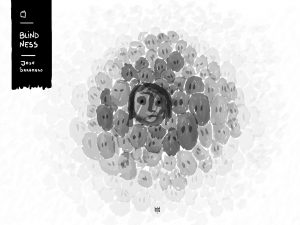From a Fearful Present to a Hopeful Future:
The Fall and Rise of Human Solidarity in Jose Saramago’s Blindness (1995)
by Selis Yıldız Şen

The world of Blindness is one that is not only about people who go blind all of a sudden upon the spread of an unknown virus, but it is also one that is about the other people who turn their backs on these people who are infected with the disease of blindness. Jose Saramago’s spine-chilling narrative revolves around these blind people, who are, so to speak, thrown into an abandoned building, left to deal with their fate on their own terms. Even from the beginning, one may see all sorts of problems that are being presented through this fiction of fear.
There are multiple presentations of worlds, or societies, within the narrative of Blindness. First, there is the world as the reader knows it and secondly, there is the world that is formed through the unfolding of the narrative. This is the microcosm that comes to being upon the new born society’s arrival at the abandoned building, where the blind people are thrown into. This abandoned asylum building is the only solution the government of this fictional reality offers to those who are infected. The government of the pre-pandemic world in the novel is indifferent to the fates of its subjects and incapable of supporting them upon their exposure to an infectuous disease. Through the consideration of its policies which lack any form of solidarity, consolation and support towards those who are in dire need of them, there emerges quite a serious and negative depiction of a government. The infected people, regardless of their age, sex or class, are subjected to the same treatment by way of being shut down to a place, a prison the atmosphere and environment of which leads to the birth of a new kind of social settlement and regulation.
The new social settlement inevitably rises through the chaos and disorder that rules the blind people. A community in such likeness is a gruesomely dark society, emanating outside the jurisdiction of any present or given governmental regulation and system. A society and its regulations which are granted by a government to the people is not so different from a society which is built by those very people themselves. The community that is formed by a third group of people, who lead their own way of living, is an exact opposite of the first formation of society. Whereas the first society lacks even the most basic human decency, and any sense of solidarity between a government and its subjects as well as the rule of democracy, the latter formation of a communal organization is built on and functions through respect, interdependence and shared decision making.
After all, the new social structure which is depicted in Saramago’s Blindness lacks every aspect of an ideal system and regulation. On the other hand, the third social organization, lead by the doctor’s wife and offering a considerably ideal image of a micro-society, evokes within the reader a certain sense of hope when it comes to consider a scenario of such potentiality.

